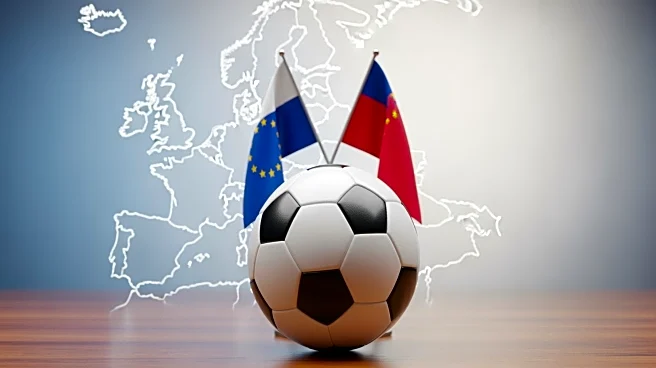What's Happening?
Lautaro Rivero, a young central defender from River Plate, is attracting significant interest from several top European football clubs. Recently linked with Atlético Madrid and Tottenham, Rivero is now reportedly on the radar of Manchester City, Juventus,
and RB Leipzig. These clubs are considering opening negotiations with River Plate during the upcoming January transfer window. Rivero's contract with the Argentine club is set to run until 2028, providing River Plate with a strong negotiating position. The player is currently training normally after overcoming discomfort that led to his substitution in a recent match, and he is expected to be ready for the Copa Argentina semifinal.
Why It's Important?
The interest in Lautaro Rivero from multiple high-profile European clubs underscores his potential as a rising star in international football. For River Plate, this could mean a lucrative transfer deal that would benefit the club financially and enhance its reputation for developing talented players. For the clubs involved, acquiring Rivero could strengthen their defensive line-ups, providing a competitive edge in their respective leagues and European competitions. The move could also impact Rivero's career significantly, offering him the opportunity to play at a higher level and gain international exposure.
What's Next?
As the January transfer window approaches, negotiations between River Plate and interested European clubs are likely to intensify. River Plate will need to weigh the benefits of a potential transfer against the value of retaining Rivero until his contract expires in 2028. Clubs like Manchester City, Juventus, and RB Leipzig will assess their defensive needs and financial capabilities to make competitive offers. Rivero's performance in upcoming matches, including the Copa Argentina semifinal, could further influence these negotiations.
Beyond the Headlines
Rivero's potential move to Europe highlights the ongoing trend of South American players transitioning to European leagues, which often offer greater financial rewards and competitive opportunities. This trend reflects the global nature of football and the interconnectedness of clubs across continents. It also raises questions about the impact on local leagues in South America, which may struggle to retain top talent.














